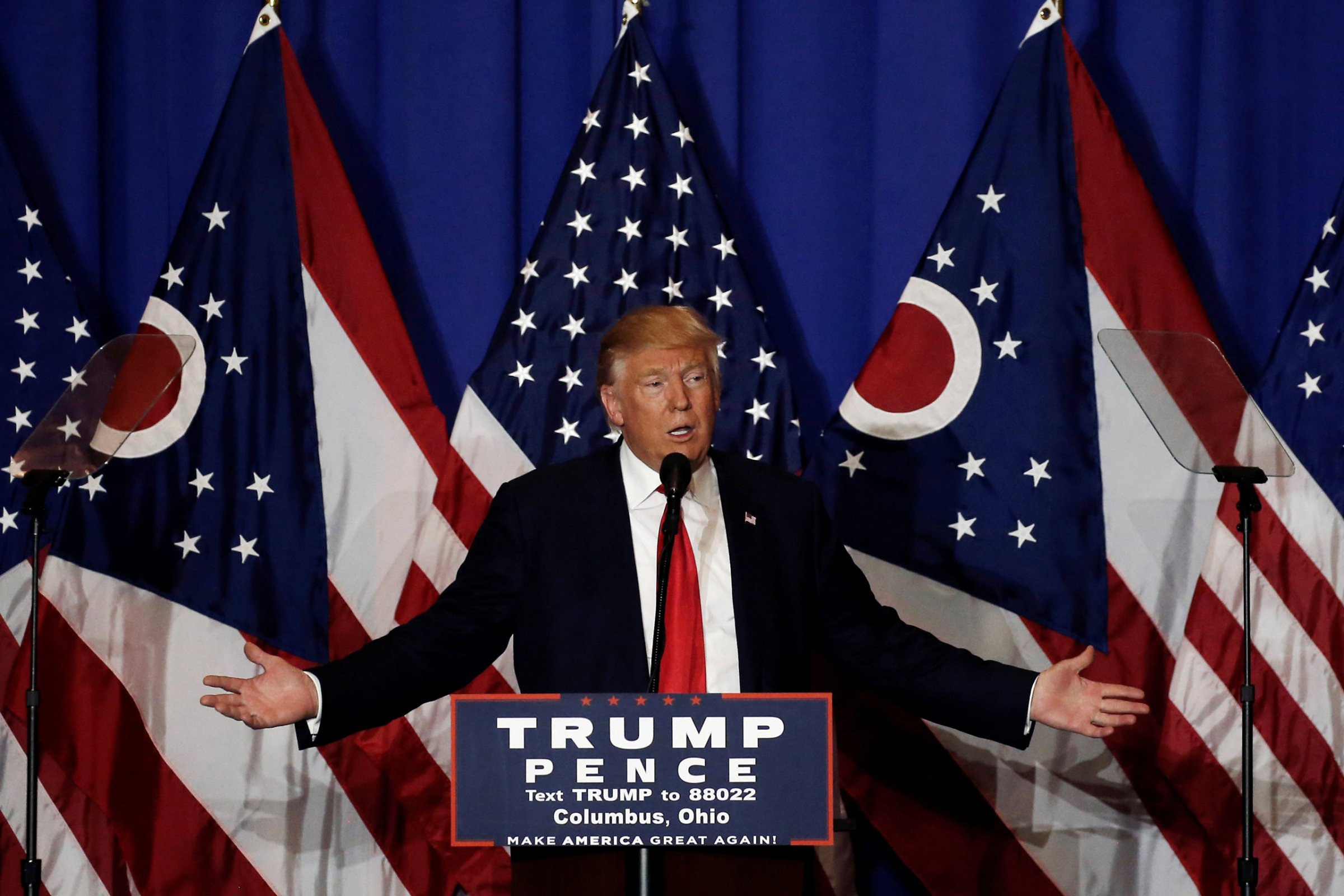
Donald Trump has mocked women, disability and war heroism during this toxic presidential campaign. So it’s no huge surprise that he’s belittled another subject that deserves no scorn — brain injury — while on the stump.
During a rally this Wednesday in Lakeland, Fla., Trump talked about a woman who had fainted but returned to the crowd. “The woman was out cold and now she’s coming back,” Trump said. “See? We don’t go by these new, and very much softer, NFL rules. Concussion. Oh, oh! Got a little ding on the head. No, no, you can’t play for the rest of the season. Our people are tough.”
Yeah, that’s real tough talk. For years, researchers have worked to show the serious consequences of those “dings” Trump dismisses (with his signature bullying sarcasm). “Concussion. Oh, oh!” — the science has found that the cumulative effects of all those dings can be deadly. In March, the NFL acknowledged a link between playing football and chronic traumatic encephalopathy (CTE), a degenerative brain disease. CTE symptoms include depression, memory loss and aggressive behavior: several NFL players who committed suicide, including Junior Seau, Dave Duerson and Andre Waters, were later diagnosed with CTE (the disease can only be diagnosed postmortem). The Boston University CTE Center has studied the brains of 94 deceased ex-NFL players; 90 of these players had CTE.
Flippant remarks from a presidential candidate can have repercussions. “With 2 million kids playing football, and millions more playing other contact sports like soccer, head injuries are a long-term public-health problem,” says Eric Nauman, a professor of biomedical engineering at Purdue University. Nauman’s research has found that even if high school football players aren’t diagnosed with a concussion, their brains can show signs of damage. “Calling out the NFL is especially worrisome,” says Nauman. “Those players are some of the most unbelievable athletes and are colliding at speeds you can’t imagine, with forces that are just incredible. To say that they’re not ‘manning up’ is one of the worst things, because of the negative influence that can have on kids. Kids want to be tough, they don’t want to let their teammates down. And if kids don’t seek treatment because of those kinds of comments, that’ll just cause problems in the end.”
Harry Carson, a Hall of Famer who played linebacker for the New York Giants, points out that the concussion crisis extends to the military. Research has shown that service members who sustained multiple brain injuries are more likely to have suicidal thoughts. In June, the Department of Veterans Affairs released a study finding that 20 veterans a day, on average, committed suicide in 2014. “In essence, if you’re calling those who play football soft for not being able to play through a concussion,” says Carson, “then you’re saying the same thing about those in the military who are dealing with traumatic brain injury.”
And what about athletes in other sports grappling with head injuries? Dale Earnhardt Jr., for example, is sitting out the rest of the NASCAR season to recover from a concussion he suffered during a June crash. Is he soft too? “Once the brain is injured, you could never recover,” says Carson, who was diagnosed with post-concussion syndrome not long after his career ended in 1988. “So to make light of it, there’s a certain amount of ignorance that’s there.”
Trump’s comments angered several current NFL players. “That’s very disrespectful for him to even speak on that matter,” New York Jets safety Calvin Pryor told the New York Daily News. “Guys who go out there and risk their lives and play for greater things, just to say some foolishness like that, man, it’s not right. For someone who [could be] one of the Presidents someday, it’s not right. It’s kind of sickening, honestly.”
Lisa McHale lost her husband, former NFL player Tom McHale, to an accidental drug overdose in 2008. Prior to his death McHale, once a passionate restaurateur in his post-NFL life, became depressed and developed a painkiller addiction. He was diagnosed with CTE after his death.
While McHale, now the director of family relations at the nonprofit Concussion Legacy Foundation, doesn’t take Trump too seriously — “It’s not really surprising that a man who came out publicly believing that he knows more than our top generals about ISIS would think he knows more about concussions than the world-renowned researchers who are studying the issue,” she says — she takes exception to these comments, calling them “dangerous.”
In a few weeks, up in Boston, McHale and the Concussion Legacy Foundation are hosting families of ex-players who’ve suffered from CTE and other brain injuries. “You can’t tell those of us who lived it that there’s nothing here,” says McHale. “He can live in denial because he hasn’t had to face the consequences. But there are many, many of us around this country that have. We know.”
More Must-Reads from TIME
- Cybersecurity Experts Are Sounding the Alarm on DOGE
- Meet the 2025 Women of the Year
- The Harsh Truth About Disability Inclusion
- Why Do More Young Adults Have Cancer?
- Colman Domingo Leads With Radical Love
- How to Get Better at Doing Things Alone
- Michelle Zauner Stares Down the Darkness
Write to Sean Gregory at sean.gregory@time.com